Module 3 period 5 Speaking Function Writing Everyday English and Cultural corner 教学设计-优质公开课
2021年外研版高二英语必修5教案:Module 3 Period 3 Speaking

Period 3: SpeakingGoalsTo tell the class what film you would like to see, and why●Procedures▇Warming up by learning about what is filmHello, class. Today we shall talk about film. I know that you are all fond of films, but what do you know about them? Film is a term that encompasses motion pictures as individual projects, as well as the field in general. The origin of the name comes from the fact that photographic film (also called filmstock) has historically been the primary medium for recording and displaying motion pictures. Many other terms exist — motion pictures (or just pictures), the silver screen, photoplays, the cinema, picture shows, flicks — and most commonly movies."Film" refers to the celluloid media on which movies are printed. Films are produced by recording actual people and objects with cameras, or by creating them using animation techniques and/or special effects. They comprise a series of individual frames, but when these images are shown rapidly in succession, the illusion of motion is given to the viewer. Flickering between frames is not seen due to an effect known as persistence of vision — whereby the eye retains a visual image for a fraction of a second after the source has been removed. Perhaps of more relevance is what causes the perception of motion — a psychological effect identified as beta movement.Film is considered by many to be an important art form; films entertain, educate, enlighten and inspire audiences. The visual elements of cinema need no translation, giving the motion picture a universal power of communication. Any film can become a worldwide attraction, especially with the addition of dubbing or subtitles that translate the dialogue. Films are also artifacts created by specific cultures, which reflect those cultures, and, in turn, affect them.■Telling the class what film you would like to see, and whyA: I’d like to see United 93, because the shock and awe of the September 11 attacks are revisited in this painstaking recreation of the last flight of one of the doomed aircraft. B: For me The King is the best film I have ever seen. A young man leaves the navy to search for a father he's never met and, upon finding him, begins a romance with his young daughter. It is interesting.C: I think the Top 10 Chinese Martial Arts Movies are worth seeing. They are the top 10 picks of Chinese martial arts movies.A: Tell us more about them, would you?C: All right. The first is The Chinese Connection. It came out in 1972. It was directed by Lo Wei and starred by Bruce Lee. I think you have heard of this great man.D: I know that it was original titled as Fist of Fury.C: You are well informed. This movie is Bruce Lee's classic. If you want to see Bruce Lee's action, this is the one.B: What about the second on the list?C: It is Enter the Dragon, shot in 1973, directed by Robert Clouse and starring Bruce Lee. This is Bruce Lee's most popular movie.D: The third one is Drunken Master, made in 1979, and directed by Yuen Woo-Ping and starring Jackie Chan.C: That is the movie which made Jackie Chan a star. It is an entertaining film, yet not too violent.E: What do you think of The Shaolin Temple?C I like it. It is the fourth on the list, and made in 1982. It is directed by Chang Hsin-Yen and starring Jet Li. This is Jet Li's first film. Jet Li was the all-round wushu champion (martial arts) at that time (about 1982). Thus if you want to see the real thing, just see Jet Li in this movie.A: I like the fifth one called Snake in the Monkey's Shadow. It was made in 1982, and directed by Sum Cheung and starring John Chang. I think it is the best martial arts movie on the monkey style, snake style, and drunken style.C: I like No. 6. It is Shaolin Master Killer. It turned out in 1983. And it is directed by Lau Kar-Leung and starring Gordon Liu. I have seen it three times because it is, as by Movie Summary, "One of the most revered martial arts films of all time, this is the story of a young man who joins the Shaolin Temple when the Manchus kill his family."E: Chinese Martial Arts Movies are my favorites, too. I like to see Supercop once again. It seems to be the seventh on the list of the T op Ten Chinese Martial Arts Movies. It was first shown in 1992. And I believe it is directed by Stanley Tong and starring Jackie Chan, Michelle Yeoh. The film displays Chan's dual mastery of。
英语 Module 3Function

6) I think you should go on a diet. 7) I’d suggest going to see him yourself. 8) It mightn’t be a bad idea to rent a camera. 9) If I were you, I’d refuse to carry out his orders. 10) You should persist in your ambition.
Conclusion We use the modal verb ______ should to give advice. We use the modal verb ____ must to give strong advice. You ______ should means It’s a good idea to …. You ____ must means It’s very important to …
In Spain you ______ should wait until 10 pm before you have dinner. In Japan you shouldn’t ________ give a penknife as a present. In Russia you must ____ make a toast
Advising somebody to do something. 1) Don’t you think it might be a good idea to start a little earlier? 2) I advise you to take exercises. 3) I should say a little work would do you no harm. 4) I think you might enjoy a holiday on the beach. 5) I think you ought to find a bigger flat.
外研必修三Module 5 Language Points in Introduction, Reading & Function
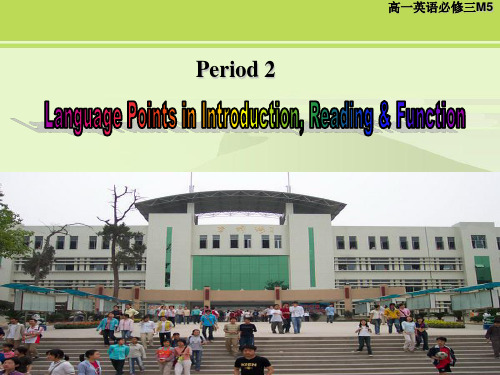
Period 2
பைடு நூலகம்
Lead-in Read the following sentences aloud, paying special attention to the underlined part. 1. Man is born good. 2. Treat others in the way you want to be treated. 3. It was a time when there were many great philosophers. 4. He stressed the importance of kindness, duty and order in society. 5. The reason why man is different from animals is that man is good. 6. In some ways, his beliefs were similar to those of Confucius.
Presenting 1. Correct the mistakes in the sentences. 1) I believe that all people are born equally. equal 2) I don’t think he is equal to look after the child. 3) Two and three equals to five. looking 4) He has no equality in physics. equal
Presenting 2. Fill in the blanks with proper prepositions. 1) I decided to treat his remark ________ as / like a joke. treat ... as / like ... 把...当...对待; 把...视作... to 2) He treated each of the children _______ an ice-cream after the game. treat sb. to sth. 请某人吃......;用某物招待某人 with the 3) The doctor is treating his illness ______ medicine you referred to just now. treat sb. with sth.用......医治某人 4) ---Which doctor is treating her for ___ her illness? ---Dr. Wang. I hope he can cure her ___ of her cancer. treat sb. for sth. 给某人治某病 cure sb. of sth. 治愈某人的某病
外研版高中英语必修3全套教案
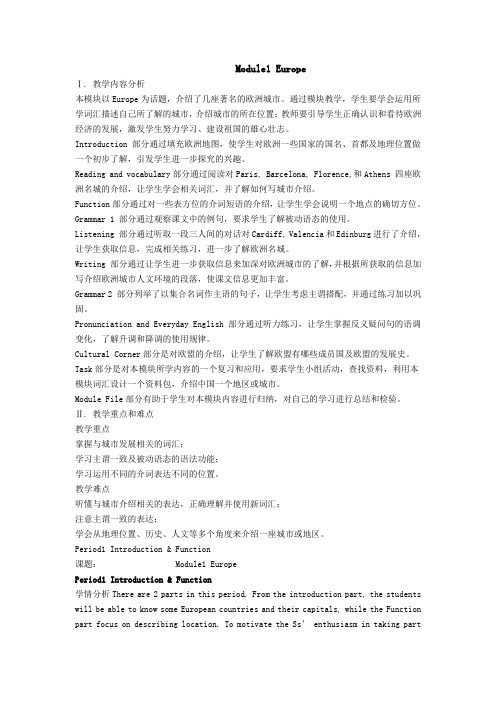
Module1 EuropeⅠ. 教学内容分析本模块以Europe为话题,介绍了几座著名的欧洲城市。
通过模块教学,学生要学会运用所学词汇描述自己所了解的城市,介绍城市的所在位置;教师要引导学生正确认识和看待欧洲经济的发展,激发学生努力学习、建设祖国的雄心壮志。
Introduction 部分通过填充欧洲地图,使学生对欧洲一些国家的国名、首都及地理位置做一个初步了解,引发学生进一步探究的兴趣。
Reading and vocabulary部分通过阅读对Paris, Barcelona, Florence,和Athens 四座欧洲名城的介绍,让学生学会相关词汇,并了解如何写城市介绍。
Function部分通过对一些表方位的介词短语的介绍,让学生学会说明一个地点的确切方位。
Grammar 1 部分通过观察课文中的例句,要求学生了解被动语态的使用。
Listening 部分通过听取一段三人间的对话对Cardiff, Valencia和Edinburg进行了介绍,让学生获取信息,完成相关练习,进一步了解欧洲名城。
Writing 部分通过让学生进一步获取信息来加深对欧洲城市的了解,并根据所获取的信息加写介绍欧洲城市人文环境的段落,使课文信息更加丰富。
Grammar 2 部分列举了以集合名词作主语的句子,让学生考虑主谓搭配,并通过练习加以巩固。
Pronunciation and Everyday English 部分通过听力练习,让学生掌握反义疑问句的语调变化,了解升调和降调的使用规律。
Cultural Corner部分是对欧盟的介绍,让学生了解欧盟有哪些成员国及欧盟的发展史。
Task部分是对本模块所学内容的一个复习和应用,要求学生小组活动,查找资料,利用本模块词汇设计一个资料包,介绍中国一个地区或城市。
Module File部分有助于学生对本模块内容进行归纳,对自己的学习进行总结和检验。
Ⅱ. 教学重点和难点教学重点掌握与城市发展相关的词汇;学习主谓一致及被动语态的语法功能;学习运用不同的介词表达不同的位置。
外研版高中英语必修三教案:Module6 Old and New
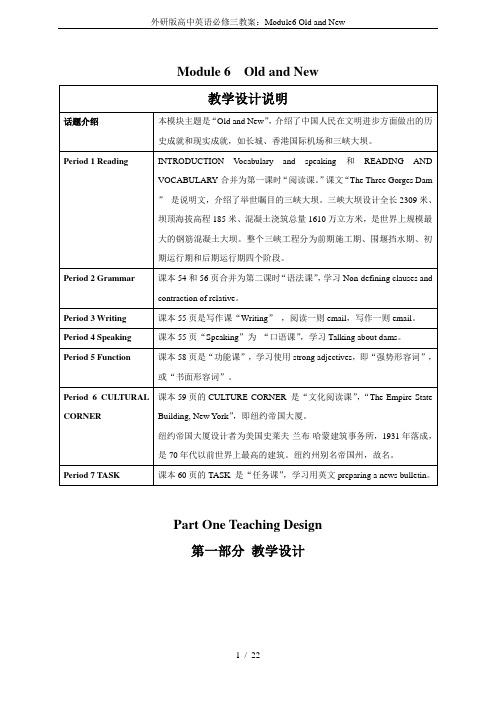
Module 6 Old and New教学设计说明话题介绍本模块主题是“Old and New”,介绍了中国人民在文明进步方面做出的历史成就和现实成就,如长城、香港国际机场和三峡大坝。
Period 1 Reading INTRODUCTION Vocabulary and speaking 和READING ANDVOCABULARY合并为第一课时“阅读课。
”课文“The Three Gorges Dam”是说明文,介绍了举世瞩目的三峡大坝。
三峡大坝设计全长2309米、坝顶海拔高程185米、混凝土浇筑总量1610万立方米,是世界上规模最大的钢筋混凝土大坝。
整个三峡工程分为前期施工期、围堰挡水期、初期运行期和后期运行期四个阶段。
Period 2 Grammar 课本54和56页合并为第二课时“语法课”,学习Non-defining clauses andcontraction of relative。
Period 3 Writing 课本55页是写作课“Writing”,阅读一则email,写作一则email。
Period 4 Speaking 课本55页“Speaking”为“口语课”,学习Talking about dams。
Period 5 Function 课本58页是“功能课”,学习使用strong adjectives,即“强势形容词”,或“书面形容词”。
Period 6 CULTURAL CORNER 课本59页的CULTURE CORNER 是“文化阅读课”,“The Empire State Building, New York”,即纽约帝国大厦。
纽约帝国大厦设计者为美国史莱夫-兰布-哈蒙建筑事务所,1931年落成,是70年代以前世界上最高的建筑。
纽约州别名帝国州,故名。
Period 7 TASK 课本60页的TASK 是“任务课”,学习用英文preparing a news bulletin。
Module3Unit5课文原文及翻译牛津深圳版八年级英语上册
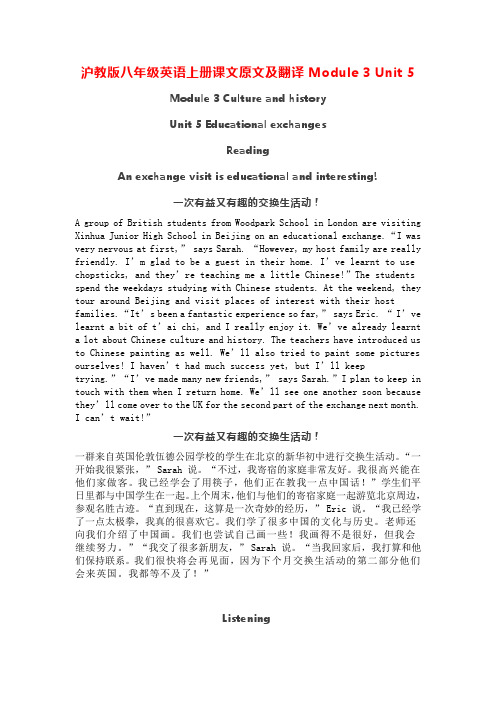
沪教版八年级英语上册课文原文及翻译Module 3 Unit 5Module 3 Culture and historyUnit 5 Educational exchangesReadingAn exchange visit is educational and interesting!一次有益又有趣的交换生活动!A group of British students from Woodpark School in London are visiting Xinhua Junior High School in Beijing on an educational exchange.“I was very nervous at first,” says Sarah. “However, my host family are really friendly. I’m glad to be a guest in their home. I’ve learnt to use chopsticks, and they’re teaching me a little Chinese!”The studen ts spend the weekdays studying with Chinese students. At the weekend, they tour around Beijing and visit places of interest with their host families.“It’s been a fantastic experience so far,” says Eric. “ I’ve learnt a bit of t’ai chi, and I really enjoy it. We’ve already learnt a lot about Chinese culture and history. The teachers have introduced us to Chinese painting as well. We’ll also tried to paint some pictures ourselves! I haven’t had much success yet, but I’ll keeptrying.”“I’ve made many new friends,” says Sarah.”I plan to keep in touch with them when I return home. We’ll see one another soon because they’ll come over to the UK for the second part of the exchange next month.I can’t wait!”一次有益又有趣的交换生活动!一群来自英国伦敦伍德公园学校的学生在北京的新华初中进行交换生活动。
Module 3Adventure+in+Literature+and+the+Cinema教案
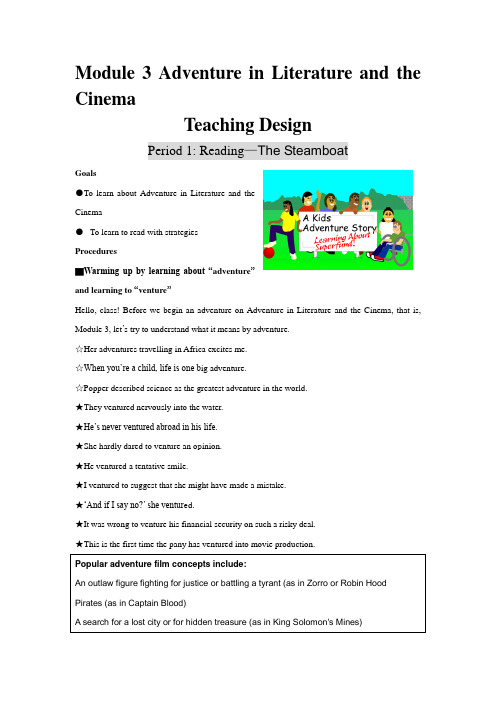
Module 3 Adventure in Literature and the CinemaTeaching DesignPeriod 1: Reading—The SteamboatGoals●To learn about Adventure in Literature and theCinema●To learn to read with strategiesProcedures▇Warming up by learning about “adventure”and learning to “venture”Hello, class! Before we begin an adventure on Adventure in Literature and the Cinema, that is, Module 3, let’s try to understand what it means by adventure.☆Her adventures travelling in Africa excites me.☆When you’re a child, life is one b ig adventure.☆Popper described science as the greatest adventure in the world.★They ventured nervously into the water.★He’s never ventured abroad in his life.★She hardly dared to venture an o p inion.★He ventured a tentative smile.★I ventured to suggest that she might have made a mistake.★‘And if I say no?’ she ventur e d.★It was wrong to venture his financial security on such a risky deal.★This is the first time the pany has ventured into movie production.■Warming up by imaging going on an adventureBoys and girls, what is adventure?Adventure is an exciting trip. If you are bored, you couldimagine going on a great adventure.Have a go at caving, climbing, sailing and canoeing atAdventure Club during the summer vocation.All the activities at Adventure Club are run and supervised byqualified and experienced staffAdventure Club started life in the 1970s as a sailing club foryoung people. Since this time it has grown and grown.Adventure Club now provides over 10,000 sessions of adventure to young people each year. Would you like to go? Then e with me!▇Before you readPlease go over the word list for this module, paying attention to the pronunciation of the word, the relationship between its pronunciation and its spelling.▇While you readCut/ the sentences into thought groups, blacken the predicates, underline the useful expressions and darken the connectives.▇After you readCopy all the useful expressions into your Expression Book and make your own sentences with them.■Read to transfer informationYou are to read the text once again to plete the table with necessary information from it.■Closing down by learning about steamboatsA steamboat or steamship, sometimes called a steamer, is a boat or vessel that is propelled by steam power driving a propeller or paddlewheel. The term steamboat is usually used to refer to smaller steam-powered boats working on lakes and rivers, particularly riverboats in the USA; steamship generally refers to steam powered shipscapable of carrying a (ship's) boat. Nuclearpowered ships and submarines use steam todrive turbines, but are not referred to assteamships or steamboats.Screw-driven steamships generally carry the ship prefix "SS" before their names, or "TS" where powered by a steam turbine. Paddle steamers have the prefix "PS". The term steamer is occasionally used, out of nostalgia, for diesel motor driven vessels, prefix "MV".Period 2: Grammar—Review of verb forms (3)Goals●To review ~ing form, the ~ed form and to + infinitive; link verbsProcedures▇Review ~ing form, the ~ed form and to + infinitive; link verbsIt is very mon to use strings of verbs - where two verbs are used in sequence. For example, the verb want is monly used in this way:I want to go home.verb 1 verb 2Only the first verb in the string is finite (has tense and subject-verb agreement). Thesecond verb must be in a non-finite form, and this can be difficult for learners as there is more than one non-finite form of the verb which can be used. monly the form used is to + infinitive, as in the example above. However, there are some mon verbs which require the -ing (present participle) form of the verb to be used in the second verb, instead of the base form. For example, the verb enjoy is monly used in this way:She enjoys dancing.verb 1 verb 2There are also some verbs such as stop which can be used in both patterns, but with different meanings. (we shall study these in the next lesson).Here is a list of some of the mon verbs used only in the pattern:verb 1 (finite) + verb 2 (-ing form)Verbs followed by the -ing formHere is a list of some of the mon verbs used only in the pattern:verb 1 (finite) + verb 2 (to + infinitive)Verbs followed by to + infinitive■Exercise: -ing or to + infinitive?In this exercise you select which is the best form of the verb to use - the -ing form or to + infinitive..1. Hello John. Fancy (to meet/ meeting) you here.2. Hello John. I didn't expect (finding/ to find) you here.3. I haven't decided (accepting/ to accept) the job yet. I want (knowing/ to know) a bit more about it.4. The students seemed (understanding/ to understand) but I'm not sure if they did.5. You must practise (to speak/ speaking) English as much as you can, and don't miss (to go/ going ) to the lessons.6. He admitted (to break in/ breaking in) to the house, but denied (to kill/ killing) the occupant.7. Don't keep (to tap/ tapping) your fingers on the table - it's very annoying.8. He decided (postponing/ to postpone) the visit again, but if he puts off (to visit/ visiting) us much longer then I'm (to go/ going) to cancel the deal.9. You have to learn (using/ to use) these difficult verbs.10. When she wouldn't agree (marrying/ to marry) him he threatened (mitting/ to mit) suicide.11. They suggested (to go/ going) to a Chinese restaurant but he wanted (eating/ to eat) Western food.12. There is a very delicious fish which people like (eating/ to eat) even though they risk (to get/ getting) poisoned.13. Everyone remended (to stay/ staying) in that hotel but it was full. But we managed (finding/ to find) a nice room in a hotel nearby.14. They don't permit (to smoke/ smoking) on the ferry although passengers tend (ignoring/ to ignore) the rule.15. She missed (to pass/ passing) the oral test by only 2 marks, although she hopes to (making up/ make up) the difference in the writing.(Keys: 1. meeting 2. to find 3. to accept, to know 4. to understand 5. speaking, going 6. breaking in, killing 7. tapping 8. to postpone, visiting, going 9. to use 10. to marry, to mit 11. going, to eat 12. to eat, getting 13. staying, to find, 14. smoking, to ignore 15. passing, make up)Period 3: SpeakingGoalsTo tell the class what film you would like to see, and why●Procedures▇Warming up by learning about what is filmHello, class. Today we shall talk about film. I know that you are all fond of films, but what do you know about them?Film is a term that enpasses motion pictures as individual projects, as well as the field in general. The origin of the name es from the fact that photographic film (also called filmstock) has historically been the primary medium for recording and displaying motion pictures. Many other terms exist — motion pictures (or just pictures), the silver screen, photoplays, the cinema, picture shows, flicks — and most monly movies."Film" refers to the celluloid media on which movies are printed. Films are produced by recording actual people and objects with cameras, or by creating them using animation techniques and/or special effects. They prise a series of individual frames, but when these images are shown rapidly in succession, the illusion of motion is given to the viewer. Flickering between frames is not seen due to an effect known as persistence of vision —whereby the eye retains a visual image for a fraction of a second after the source has been removed. Perhaps of more relevance is what causes the perception of motion — a psychological effect identified as beta movement.Film is considered by many to be an important art form; films entertain, educate, enlighten and inspire audiences. The visual elements of cinema need no translation, giving the motion picture a universal power of munication. Any film can bee a worldwide attraction, especially with the addition of dubbing or subtitles that translate the dialogue. Films are also artifacts created by specific cultures, which reflect those cultures, and, in turn, affect them.■Telling the class what film you would like to see, and whyA: I’d like to see United 93, because the shock and awe of the September 11 attacks arerevisited in this painstaking recreation of the last flight of one of the doomed aircraft.B: For me The King is the best film I have ever seen. A young man leaves the navy to search for a father he's never met and, upon finding him, begins a romance with his young daughter. It is interesting.C: I think the Top 10 Chinese Martial Arts Movies are worth seeing. They are the top 10 picks of Chinese martial arts movies.A: Tell us more about them, would you?C: All right. The first is The Chinese Connection. It came out in 1972. It was directed by Lo Wei and starred by Bruce Lee. I think you have heard of this great man.D: I know that it was original titled as Fist of Fury.C: You are well informed. This movie is Bruce Lee's classic. If you want to see Bruce Lee's action, this is the one.B: What about the second on the list?C: It is Enter the Dragon, shot in 1973, directed by Robert Clouse and starring Bruce Lee. This is Bruce Lee's most popular movie.D: The third one is Drunken Master, made in 1979, and directed by Yuen Woo-Ping and starring Jackie Chan.C: That is the movie which made Jackie Chan a star. It is an entertaining film, yet not too violent.E: What do you think of The Shaolin Temple?C I like it. It is the fourth on the list, and made in 1982. It is directed by Chang Hsin-Yen and starring Jet Li. This is Jet Li's first film. Jet Li was the all-round wushu champion (martial arts) at that time (about 1982). Thus if you want to see the real thing, just see Jet Li in this movie.A: I like the fifth one called Snake in the Monkey's Shadow. It was made in 1982, and directed by Sum Cheung and starring John Chang. I think it is the best martial arts movie on the monkey style, snake style, and drunken style.C: I like No. 6. It is Shaolin Master Killer. It turned out in 1983. And it is directed by Lau Kar-Leung and starring Gordon Liu. I have seen it three times because it is, as by Movie Summary, "One of the most revered martial arts films of all time, this is the story of ayoung man who joins the Shaolin Temple when the Manchus kill his family."E: Chinese Martial Arts Movies are my favorites, too. I like to see Supercop once again. It seems to be the seventh on the list of the Top Ten Chinese Martial Arts Movies. It was first shown in 1992. And I believe it is directed by Stanley Tong and starring Jackie Chan, Michelle Yeoh. The film displays Chan's dual mastery of physical edy and martial arts while also showcasing his notorious predilection for handling his own stunts."A: I think Fist of Legend is good, too. It came out in 1994, and was directed by Gordon Chan and starring Jet Li. It is said that Fist of Legend is the best movie by Jet Li. This is a remake of Bruce Lee's The Chinese Connection.C: We are really fans of martial arts movies. Let’s go and see them after school!■Reading about Master and manderPlot Summary for Master and mander: The Far Side of the World(2003)During the Napoleonic Wars, a British frigate, HMS Surprise, and amuch larger French warship, the Acheron, with greater fire power, stalkeach other off of the coast of South America. Russell Crowe brings greatintensity to the role of Captain Jack Aubrey. Lucky Jack, as he is referred to by his crew, is well regarded by his men, who trust him implicitly, even after the first devastating battle and an apparent personal vendetta against the French captain. While the naval battle sequences are quite fantastic, the film is successful because director Weir chose to build the story to get to know the men who are locked aboard the tight quarters of a small ship and how they interact everyday. The officers and the mates are well-known by the time the final battle es. Paul Bettany offers a strong performance as the surgeon and naturalist who balances the violence of his chosen life with the quiet demeanor of the scientist. He is the captain's friend and confidant, the two frequently playing violin and cello duets together. The horrors of the injuries from the war are frequently implied, but vividly depicted in the reactions of the characters.■Closing down by retelling the story of Master and manderDuring the Napoleonic Wars, Lucky Jack Aubrey captains the crew of his H.M.S. Surprise. When the ship is suddenly attacked by a superior enemy, it is badly damaged and much of his crew is injured. In a bold and dangerous move, Aubrey decides to set sail in a high stakes chase across two oceans to intercept and capture their foe. It's a mission that can decide the fate of a nation--or destroy Lucky Jack and his crew.Period 4: FUNCTION—Reporting statements and suggestionsGoalsTo learn to report statements and suggestionsProcedures▇Warming up by learning about r eported speech - indirect speechIndirect Speech (also referred to as 'reported speech') refers to a sentence reporting what someone has said. It is almost always used inspoken English.He said, "I live in Paris." He said he lived in Paris.He said, "I am cookingdinner."He said he was cooking dinner.He said, "I have visted London twice."He said he had visited London twice.He said, "I went to New York last week."He said he had gone to New York the week before.He said, "I had alreadyeaten."He said he had already eaten.He said, "I am going to find a new job."He said he was going to find a new job.He said, "I will give Jack acall."He said he would give Jack a call.■municating with direct and indirect speech●If the reporting verb (i.e. said) is in the past, the reported clause will be in a past form. This form is usually one step back into the past from the original.For example:He said the test was difficult.She said she watched TV every day.Jack said he came to school every day.●If simple present, present perfect or the future is used in the reporting verb (i.e. says) the tense is retained.For example:He says the test is difficult.She has said that she watches TV every day.Jack will say that he es to school every day.●If reporting a general truth the present tense will be retained.For example:The teacher said that phrasal verbs are very important.●Changing Pronouns and Time SignifiersWhen changing from direct speech to indirect speech, it is often necessary to change the pronouns to match the subject of the sentence.For example:She said, "I want to bring my children." BEES She said she wanted to bring her children.Jack said, "My wife went with me to the show." BEES Jack said his wife had gone with him to the show.●It is also important to change time words (signifiers) when referring to present, past or future time to match the moment of speaking.For example:She said, "I want to bring my children tomorrow." BEES She said shewanted to bring her children the next day.Jack said, "My wife went with me to the show yesterday." BEES Jack said his wife had gone with him to the show the day before.●Indirect QuestionsWhen reporting questions, it is especially important to pay attentionto sentence order. When reporting yes/ no questions connect the reported question using 'if'. When reporting questions using question words (why, where, when, etc.) use the question word.For example:She asked, "Do you want to e with me?" BEES She asked me if I wanted to e with her.Dave asked, "Where did you go last weekend?" BEES Dave asked me where I had gone the previous weekend.He asked, "Why are you studying English?" BEES She asked me whyI was studying English.■Closing down by making a summary of Reporting statements and suggestionsVERB TENSEWH- QUESTIONCHANGEPRESENT PASTMy friend "How are you?" My friend asked how Isaid, was.PRESENTPROGRESSIVEPAST PROGRESSIVEMy friend said,"Where are yougoing?"My friend asked whereI was going.PAST PAST PERFECTMy friendsaid, " Whom did you call?"My friend asked whomI had called.PAST PROGRESSVEPAST PERFECTPROGRESSVEMy friend said," Whom I wascalling?"My friend asked whomI had been calling.PRESENT PERFECT PAST PERFECTMy friend said," Where have youbeen?"My friend asked whereI had been.PRESENT PERFECTPROGRESSVEPAST PERFECTPROGRESSVEMy friend said," How have you beendoing?"My friend asked how Ihad been doing.PRESENT - GENERAL TRUTHPRESENT - GENERAL TRUTHMy friendsaid, "Where is Venus?"My friend asked whereVenus is.Period 5: WritingGoals●To learn to read and write summaries of filmsProcedures▇Warming up by glancing over The Adventures of Huckleberry Finn哈克贝里·芬历险记第01章教哈克学文明规矩——华珍小姐——汤姆·索亚在等候第02章两个孩子逃过了杰姆的搜寻——汤姆·索亚的帮伙——精心作出的计划第03章全身查看了一遍——主日得胜——“汤姆·索亚的一次谎话”第04章哈克与法官——迷信第05章哈克的父亲——好父亲——改造第06章他控告法官撒切尔——哈克决定要出走——政治经济学言论——折腾第07章守候着他——给锁在木屋里——把尸体沉下去——歇息第08章睡在林子里——打捞起死者——察勘全岛——发现了杰姆——杰姆的出逃——预兆第09章山洞——漂流的屋子第10章发现——“老汉克·朋格”——男扮女装第11章哈克和村妇——搜捕——支吾搪塞——去高申第12章缓慢的航行——借东西——上破船——歹徒——搜寻小船第13章逃出破船——守夜人——沉没第14章快活的时光——后宫——法语第15章哈克丢了木筏子——雾中——哈克找回了木筏子——垃圾第16章期待——一次没有恶意的谎话——漂来的钱财——错过开罗——往岸边游去第17章章黄昏时叫门——阿肯色的田庄——室内陈设——斯蒂芬·道林·博茨——诗兴第18章格伦基福特上校——贵族门第——打冤家——《新约全书》——收回了木筏子第19章白天停靠——一个天文学说——重振戒酒运动——勃里奇华特公爵——王室遭难第20章哈克作解释——策划一次战役——到野营会上施展一番——野营会上的一名海盗第21章斗剑操练——哈姆雷特独白——他们在镇上四处蹓跶——一个懒散的市镇第22章歇朋——看马戏——在马戏场里发酒疯——惊心动魄的悲剧第23章上当——拿国王跟国王比——杰姆想家心切第24章披了王袍的杰姆——他们收了个乘客——打听情况——一家人的悲痛第25章“是他们么?”——唱颂歌——光明正大——殡葬酒宴——投错了资第26章一位虔诚的国王——国王的教士——她向他赔不是——在房间里躲起来第27章葬仪——满足好奇心——对哈克起了疑心——薄利快销第28章准备去英国——“这畜牲”——玛丽·珍妮决计离家——哈克分别玛丽·珍妮第29章争当家属——国王对丢钱作了解释——笔迹问题——把尸体从墓中挖出来第30章国王和他闹开了——国王勃然大怒——烂醉如泥第31章凶险的策划——来自杰姆的消息——回忆往事——一头羊的故事——宝贵的信息第32章静悄悄象过星期天一般——认错了人——露马脚——进退两难。
2023年高中英语(外研版)必修五 Unit 5 Speaking skills 课件

2023年高中英语(外研版)必修五 Unit 5Speaking skills 课件Unit 5 Speaking Skills 课件2023年高中英语(外研版)必修五In this unit, we will focus on developing effective speaking skills. Speaking is an essential skill that allows us to communicate our thoughts, ideas, and feelings effectively. Whether it's in a personal or professional context, being able to speak confidently and articulately can greatly enhance our interactions with others.I. Warm-up ActivityTo begin today's lesson, let's start with a warm-up activity that will get us thinking and speaking in English. Split the class into pairs or small groups, and ask each group to discuss the following questions:1. What are some challenges you face when speaking in English?2. How do you overcome these challenges?3. Can you think of any strategies or techniques that can help improve your speaking skills?Give the groups a few minutes to discuss and share their ideas. Afterward, ask each group to share their insights with the rest of the class.II. Speaking StrategiesNow, let's explore some speaking strategies that can help improve your fluency and confidence.1. Use Functional Language:Functional language refers to the language used in specific situations, such as making suggestions, giving advice, expressing opinions, etc. Learning and using functional language can provide you with ready-made phrases and expressions that are commonly used in everyday conversations or formal settings.2. Practice Role-plays:Role-plays are an excellent way to simulate real-life situations and practice speaking. They allow you to take on different roles and engage in conversations, negotiations, or debates with your classmates. By actively participating in role-plays, you can enhance your speaking skills and develop the ability to think on your feet.3. Record and Self-Reflect:Recording yourself while speaking English can be an effective self-assessment tool. Listen to the recordings and analyze your pronunciation, intonation, and clarity. Identify areas for improvement and work on them systematically. Additionally, try to notice any repetitive mistakes or speech patterns to become aware of your own speaking tendencies.III. Speaking ActivitiesIn this section, we will engage in various speaking activities to put our speaking skills into practice. These activities aim to encourage active participation and provide opportunities for meaningful conversations.1. Group Discussions:Divide the class into small groups and assign a topic or theme for discussion. Each group should brainstorm ideas, express their opinions, and engage in a productive conversation. Encourage all group members to share their thoughts and actively listen to others. After the discussion, groups can present a summary of their conversation to the rest of the class.2. Debate:Choose a controversial topic and divide the class into two teams: one in favor and one against the topic. Each team will take turns presenting arguments and counter-arguments. This activity helps students refine their speaking skills by expressing their viewpoints persuasively and respectfully.3. Presentations:Ask students to prepare short presentations on a topic of their choice. These presentations can focus on personal experiences, research findings, or any other area of interest. Provide guidelines for structuring the presentation and encourage the use of visual aids, such as slides or props. After each presentation, allow time for questions and discussions.IV. ConclusionIn conclusion, developing effective speaking skills is crucial for effective communication. By using strategies like functional language, role-plays, andself-reflection, students can enhance their fluency and confidence in speaking English. Engaging in speaking activities, such as group discussions, debates, and presentations, provides valuable opportunities for practice and improvement.Remember, practice makes perfect! So keep practicing and honing your speaking skills to become a confident and fluent English speaker. Good luck!。
高中英语 Module 5 Cloning Period 3 Function,Speaking and Writing课件 外研版选修6
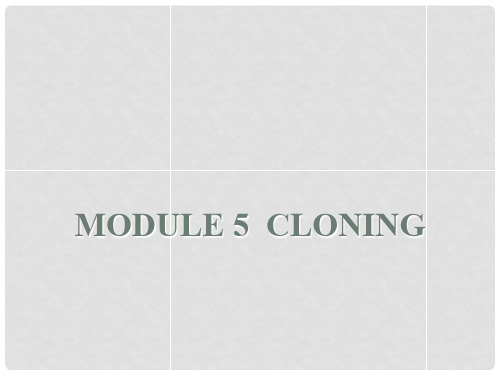
It wished it c_o_u_l_d__ch__a_n_g_e its appearance and show people _it_s kind heart. But months passed and the monster started to understand that it w__o_u_ld_ always be alone. Now it _w_a_s_/_b_e_ca_m__e_angry and unhappy, and started to wish that the scientist _h_a_d_n_’_t_m__a_d_e_it.
monster lived alone in the woods, f_i_n_d_in_g_/_g_e_t_ti_n_g_ food where it could. Sometimes the lonely _cr_e_a_t_u_r_e_/m__o_n_s_t_er_ met human beings, and tried to speak to them and m__a_k_e_/_b_e_c_o_m_e_friends, but they
5. I didn’t create a real human being. I wish I h__a_d_c_r_e_a_te_d_ (create) a human being.
6. I feel lonely and unhappy. I wish I d__id_n_’_t_f_e_e_l (not feel) unhappy.
MODULE 5 CLONING
FUNCTION SPEAKING &
WRITING
TALKING ABOUT PAST AND
高一英语人教版必修3教案:Unit5UsingLanguage:Speakingandwriting+Word版含解析
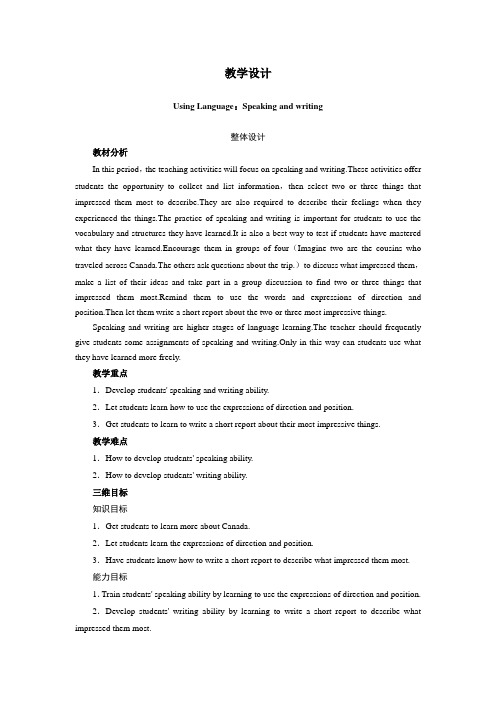
教学设计Using Language:Speaking and writing整体设计教材分析In this period,the teaching activities will focus on speaking and writing.These activities offer students the opportunity to collect and list information,then select two or three things that impressed them most to describe.They are also required to describe their feelings when they experienced the things.The practice of speaking and writing is important for students to use the vocabulary and structures they have learned.It is also a best way to test if students have mastered what they have learned.Encourage them in groups of four(Imagine two are the cousins who traveled across Canada.The others ask questions about the trip.)to discuss what impressed them,make a list of their ideas and take part in a group discussion to find two or three things that impressed them most.Remind them to use the words and expressions of direction and position.Then let them write a short report about the two or three most impressive things.Speaking and writing are higher stages of language learning.The teacher should frequently give students some assignments of speaking and writing.Only in this way can students use what they have learned more freely.教学重点1.Develop students' speaking and writing ability.2.Let students learn how to use the expressions of direction and position.3.Get students to learn to write a short report about their most impressive things.教学难点1.How to develop students' speaking ability.2.How to develop students' writing ability.三维目标知识目标1.Get students to learn more about Canada.2.Let students learn the expressions of direction and position.3.Have students know how to write a short report to describe what impressed them most.能力目标1.Train students' speaking ability by learning to use the expressions of direction and position.2.Develop students' writing ability by learning to write a short report to describe what impressed them most.情感目标1.Have students learn more about Canada and stimulate their love of nature.2.Train students' ability to cooperate with others.教学过程Step 1 Revision1.Check the homework exercises.2.Ask some of students to retell the passage “THE TRUE NORTH”FROM TORONTO TO MONTREAL.Step 2 Warming up1.Let students read through the passage “THE TRUE NORTH”FROM TORONTO TO MONTREAL again and find out all the sentences that contain words and expressions of direction and position.Read them aloud and translate them into Chinese.2.Show the following on the screen.Have students read them aloud and make sure they know their meanings.Expressions of direction and positionWhere is…?In what direction is…?How does one go to…?How far is…?Is it nearby?Is…close to…?Is…far from…?It's…kilometers from…to…within…kilometers of…It's about…kilometers northeast of… is clos e to…in the north/south/west/east of… to the north/south/west/east of…on the north/south/west/east of… go eastward/westward/northward/southwardacross the continent/lake through the forests along the coast/river3.Ask students in pairs to ask and answer questions using the expressions above.Step 3 Speaking1.Have students brainstorm the question:What adjectives do you use when you describe your feelings?(excited,afraid,terrified,worried,tired,pleased,happy,impressed,surprised,amazed,sa tisfied…)2.Suppose the situation:Work in groups of four.Imagine two of you are the cousins who traveled across Canada.The others ask questions about the trip.3.Let each group discuss the following questions and make notes in the table below.What impressed you?Where was it?How did it make you feel?4.Have them select two or three things that impressed them most.5.Let them make a dialogue to talk about the two or three most impressive things and their feelings when they experienced them.6.Ask as many groups as possible to perform their dialogues to the class.Step 4 WritingTask:Write a short report about the two or three most impressive things during the trip across Canada.1.Let students make a writing plan.Show the following on the screen to help them.Be sure that your report has:1)a title2)a short paragraph to introduce the report's topic.3)a paragraph for each impressive thing you are presenting(be sure to include its location and how it made you feel)4)a short conclusion2.Allow students enough time to write their reports.3.Let some of them read their reports to the class.Others should give comments.Step 5 Writing Task1.Suppose the situation:A group of visiting students are coming on a three to five-day tour of your city or town.Plan what places are best for them to visit,in which direction they will go and what the places are like.2.Remind them to use the words and expressions they have learned for geographical direction and location.Then allow them to begin to write.3.When most of them finish,let some read their plans to the class.The teacher and others should give comments.Step 6 Homework1.Finish off the Workbook exercises.2.Review the contents of the unit and complete Summing Up on Page 40.3.Write your short report in the exercise book.板书设计Unit 5Canada—“The True North”Speaking and writingExpressions of direction and positionWhere is…?In what direction is…?How does one go to…?How far is…?Is it nearby?Is…close to…?Is…far from…?It's…kilometers from…to…within…kilometers of…It's about…kilometers northeast of… is close to…in the north/south/west/east o f… to the north/south/west/east of…on the north/south/west/east of… go eastward/westward/northward/southwardacross the continent/lake through the forests along the coast/river活动与探究Work in pairs.Look at the map of China.Find two places that are a long distance from your home and explain to your partner where they are and how to get there.Be ready to present your conversation to the class.Remember to use the expressions of direction and position.备课资料Further readingCanada is situated in the northern half of the North American continent in the Western Hemisphere.To the south,it shares an 8892 km boundary with the United States.On the other sides,Canada is surrounded by water:to the north of the country is the Arctic Ocean;to the east is the Atlantic Ocean and to the west is the Pacific Ocean.The total area is 9 970 610 square kilometers,which makes it the second largest country in the world after Russia.In comparison,it is more than forty times the size of Britain,or eighteen times that of France.From east to west,it covers six time zones.The easternmost in Newfoundland,is three hours and 30 minutes behind Greenwich Mean Time(GMT).The other time zones are the Atlantic,the Eastern,the Central,the Rocky Mountains and,farthest west,the Pacific,which is eight hours behind GMT.As we all know,Canada has many lakes.In fact,there are probably more lakes in Canada than in any other country in the world.It has been estimated that lakes cover almost 8 percent of its total area,and it has oneseventh of the world's fresh water.In addition to the Great Lakes,which it shares with the United States,Canada has many large rivers and lakes.Great Bear Lake in the Northwest Territories is the largest lake situated entirely in Canada;its area is 31 326 square kilometers.The longest river is the Mackenzie River.It has a length of 4241 kilometers.The Rocky Mountains,the Coastal Mountains and a number of other ranges run north to south.Mount Logan(5951 m)in the Yukon is Canada's tallest peak.Canada is a federation of provinces.It is made up of 10 provinces and 2 territories,each with its own capital city(in brackets):Alberta(Edmonton),British Columbia(Victoria),Prince Edward Island(Charlottetown),Manitoba(Winnipeg),New Brunswick(Fredericton),Nova Scotia(Halifax),Ontario (Toronto),Quebec(Quebec City),Saskatchewan(Regina),Newfoundland(St John's),Northwest Territories(Yellowknife)and Yukon Territory(Whitehorse).The capital city,Ottawa,is in the province of Ontario.。
高中英语外研版必修4Module3 课件 (共72张PPT)

1. Guns and knives are two different types owf e_a_p_o_n. s 2. Someone who has a(n) __a_g_g_re_s_s_iv_e_ attitude may
be violent. 3. You can _g_r_e_e_t_ someone by saying “hello” 4. Your _p_o_si_t_io_nis the way you are sitting or standing.
b) I point to the way and say, “go this way please.”
c) I wave my hand and say “hello” d) I give him the gift and say,
“happy birthday to you”. e) I nod my head. f) I shake my hands and my head. g) I open my eyes wide pointing
You have to believe in yourself. That's the secret of success. 人必须相信自己,这是成功的秘诀。
Introduction – 3. Speaking What will you do when…?
1. meet a friend 2. show someone
2. Can you give reasons for your choice?
Reading – 1. Pre-reading What words come to you when seeing the picture?
外研版高中英语必修五Module1BritishandAmericanEnglish课件

(madeofdingshangtuwen)
课课时时分配
板块结合范例
Period 1
Introduction + Reading and Speaking
Period 2 Vocabulary +Grammar + Function
Period 3 Period 4
Vocabulary and Listening + Everyday English
8
Key to the answers
• The second writer is American.
somBeritiosfh tEhneglrisehasons wAemkenroicwanaErneg:lish
Mum
Mom
programme
program
theatre
theater
realised
optimistic?
American
3. Which is the most pessimistic?
English 2. D 3. B
4. Which (if any) do you
4. (open)
think are funny?
5. D
5 Which is good news for
6. Henry Sweet
words and structures passing into British English,…
7. This international dimensionsuggests that
in the future, there are going to be many “Englishes”, not just two main varieties. 19
高中英语外研版必修三module3 The Violence of Nature单元练习试题
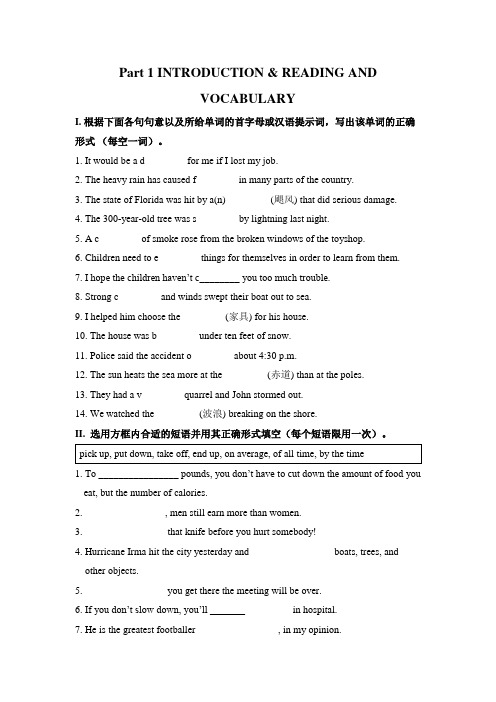
Part 1 INTRODUCTION & READING ANDVOCABULARYI. 根据下面各句句意以及所给单词的首字母或汉语提示词,写出该单词的正确形式(每空一词)。
1. It would be a d________ for me if I lost my job.2. The heavy rain has caused f________ in many parts of the country.3. The state of Florida was hit by a(n) ________ (飓风) that did serious damage.4. The 300-year-old tree was s________ by lightning last night.5. A c________ of smoke rose from the broken windows of the toyshop.6. Children need to e________ things for themselves in order to learn from them.7. I hope the children haven’t c________ you too much trouble.8. Strong c________ and winds swept their boat out to sea.9. I helped him choose the ________ (家具) for his house.10. The house was b________ under ten feet of snow.11. Police said the accident o________ about 4:30 p.m.12. The sun heats the sea more at the ________ (赤道) than at the poles.13. They had a v________ quarrel and John stormed out.14. We watched the ________ (波浪) breaking on the shore.II. 选用方框内合适的短语并用其正确形式填空(每个短语限用一次)。
- 1、下载文档前请自行甄别文档内容的完整性,平台不提供额外的编辑、内容补充、找答案等附加服务。
- 2、"仅部分预览"的文档,不可在线预览部分如存在完整性等问题,可反馈申请退款(可完整预览的文档不适用该条件!)。
- 3、如文档侵犯您的权益,请联系客服反馈,我们会尽快为您处理(人工客服工作时间:9:00-18:30)。
1.How toreport a natural disaster;train writing ability
2.Learn something about earthquakes around the Pacific
难点
1.How to help the students to give a definition to a abstract noun and how to write about a violent natural disaster. 2.Master the difficult language points
课型
New
教学
目标
1.Reporting a natural disaster;
2.Giving a definition;
3.writing about a violent natural disaster;
4.mastering some everyday English.
5.Earthquakes Around the Pacific
Violent natural event
When
Where
Why
How strong
Damage
3 Read your writing to your partner. Check and rewrite your writing according to the following. Then share it with the whole class.
师生
活动
时间分配
Step 1
Step 2
Step 1 Speaking
Student A: You are a television reporter. You are reporting on a natural disaster.
1 Make a list of questions to ask.
Go to the library or surf the Internet to find some information about the volcanic eruption,then do a presentation for tomorrow.
A lightning is the flash of lightwhichoccurs during a thunderstorm.
A tornado is a column of airthatturns very quickly.
2 Give definitions of the words following the patterns listed above.
Are there any spelling mistakes?
Step 4 Everyday English
Finish the exercises at Activity 2,Page 28.
1 Fortunately/ Thankfully/ Luckily 2 Unfortunately/ Sadly
Student B: You are local residents in the area of the violent natural event.
1 Decide which kind of violent natural event you
2 Think of things that happened to you or things that you saw.
Are you clear what happen (4W and 1H)?
Do you know the writer's attitude and emotion?
Are there any good connecting words or phrases?
Are there any good phrases or sentences?
3 Tell the reporter where you are and what you saw.
Step 2 Function
1 Try to find sentences in the text which gives a definition of a word.
A flood is a lot of water in an areawhichis usually dry.
(3) Where did the person have to stay?In their rooms.
(4) For how long?About two days.
2 Fill the blank first,then reorganize all information into a passage.
学情分析
The Ss can finish the task.
教具课件
1. A recorder 2. A projector 3. A computer
教法
explaining,practicing and listening
reading and explaining
教学程序
教学内容(引入、例题、练习题、检测题等)
3 Fortunately/ Thankfully/ Luckily 4 Hopefully/ Fortunately/ Thankfully/Luckily
5. Unfortunately/ Sadly 6. Fortunately/ Thankfully/ Luckily
Step 5 Homework
Module 3 period 5 Speaking, Function, Writing, Everyday English and Cultural corner教学设计
课题
Period 5Speaking,Function,Writing,Everyday English
andCultural corner
An earthquake a volcanic eruption a plane crash
Step 3 Writing
1 Read the passage and answer the questions.
(1) Where did this happen?Near the beach.
(2) What happened to the trees?Begin to mห้องสมุดไป่ตู้ve from side to side.
